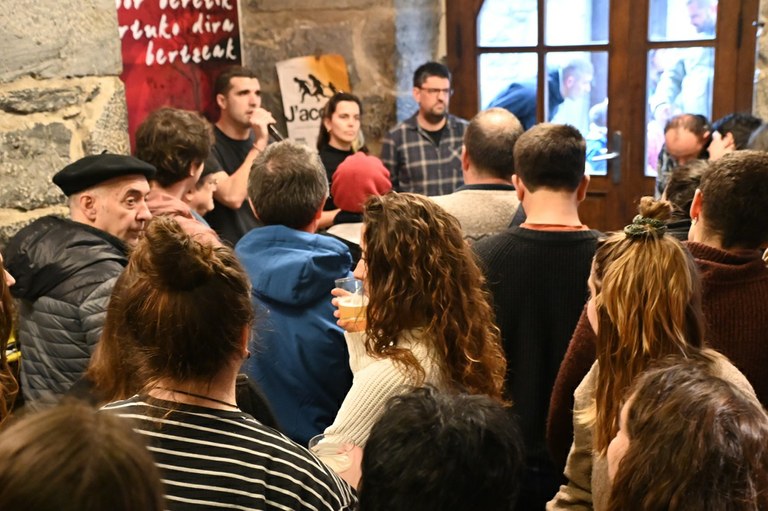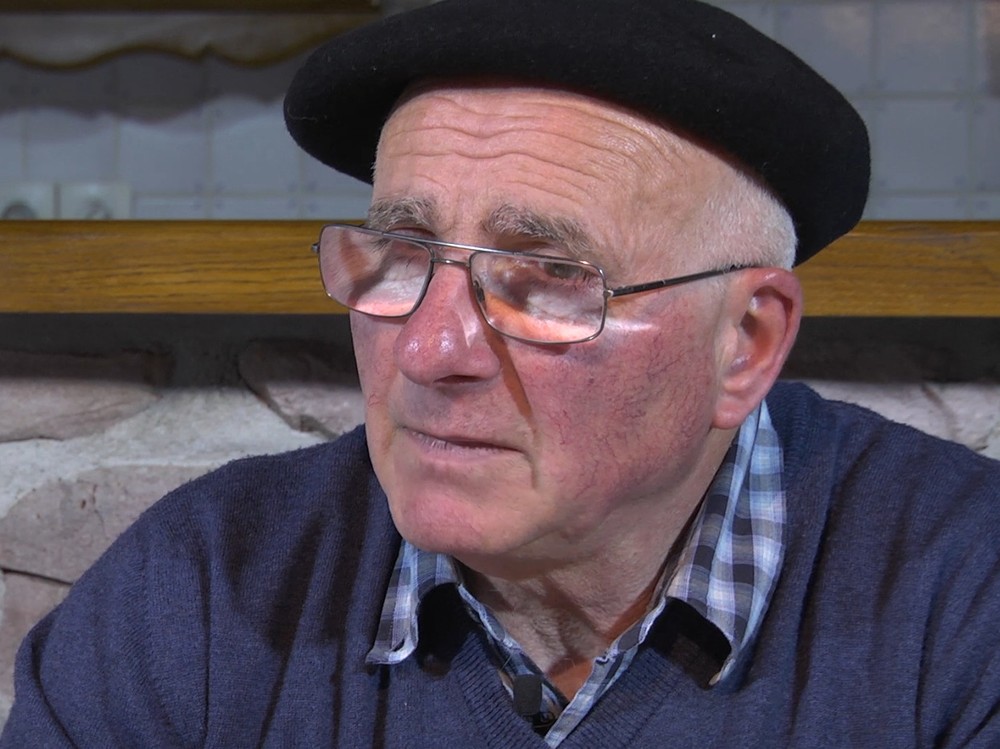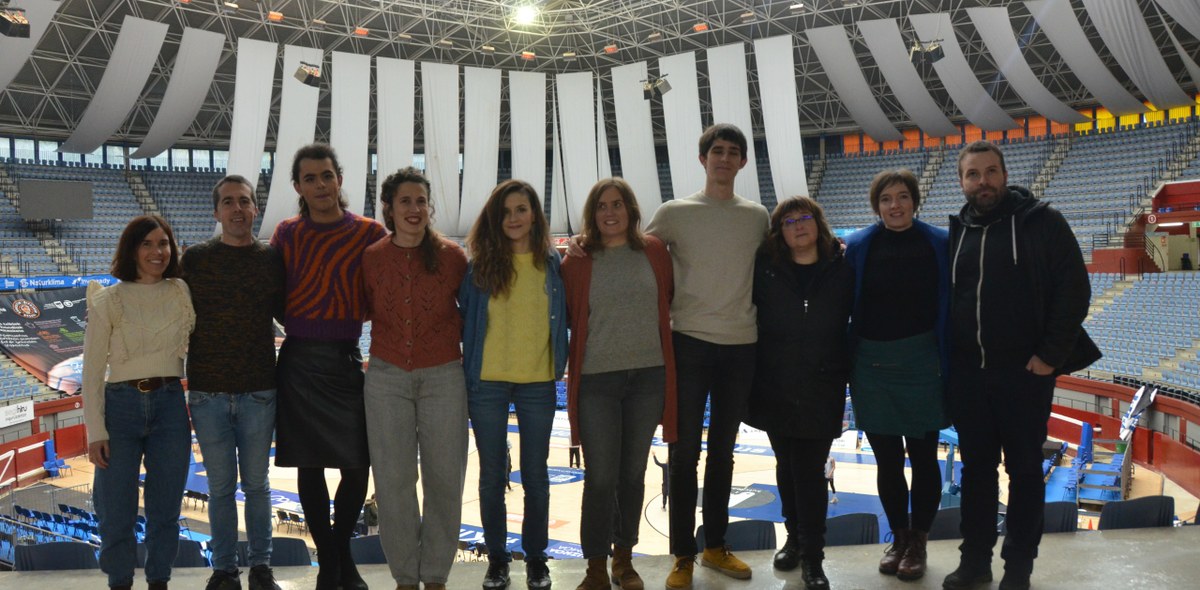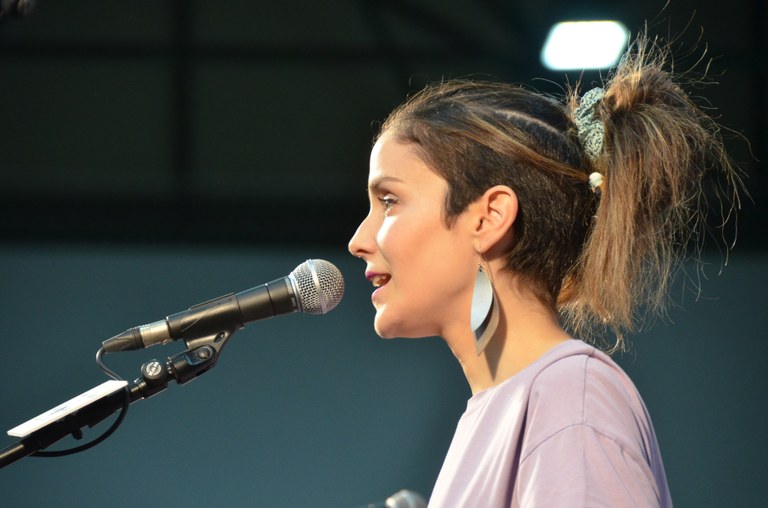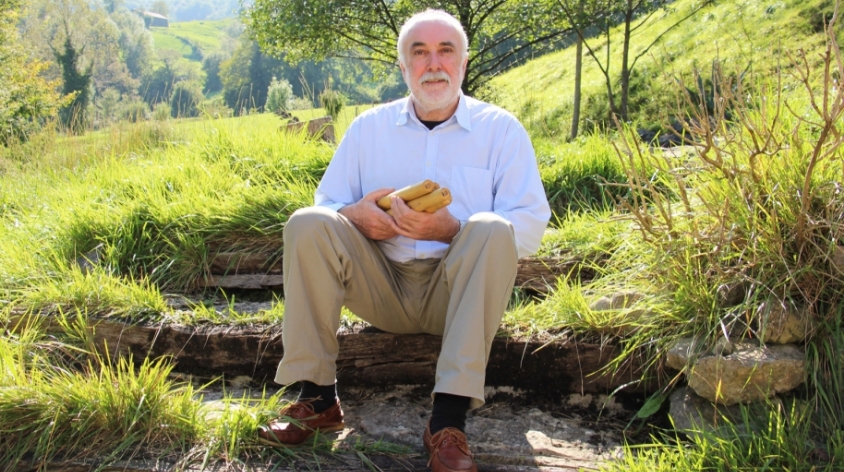Prepared for challenge
- It is the neighborhood of the two teams that have come to the end in the Intervillages of Gipuzkoa. Am...ona (Amasa-Villabona) and Karidadeko Benta (Zizurkil-Asteasu). It was the students of Amaia Agirre who joined them in childhood and today they are joined by the Bertsozale Taldea of Tolosaldea Harituz. Its verses are more of the Otañans, of Pello Errota or of Zabala than of the tendency that Euskal Herria has dominated in recent decades. On 27 May you have the opportunity to listen to him in Azpeitia.

We met in the cafeteria Amasa de Villabona with the bertsolaris of both groups (except Joseba Otaegi, who was in the relay). The bertsolaris from both ends of Euskal Herria are entering and leaving the cafeteria, the headquarters of the Bertsozale Elkartea Association, Casa Mintzola, one of the hallmarks of the area. The questions have been answered through reified interviews, in which the eccentricities of their peers have been included, sometimes suddenly and sometimes indirectly. They are skilled speakers and one of them feels that life is a desahogo.En the Intervillages have
participated 38 groups and told us that it has served to sewing the network among fans of bertsos. Ander Goikoetxea is Arana, an example of this in the Bertsolaris; it is the exception, who has not been a professor of Amaia Agirre since childhood: “At 27 years old we organized a bertso-eskola for adults in Villabona. Then, from time to time, we met and played. When I was called to be an organizer of the AMONA group for Interpeoples, I told them that I was going to sing.” Oihana Iguaran soon said: “We knew you wouldn’t accept it by calling the bertsos and we called you to organize it, and then inciting it to the bertsos.” The fans of the people have joined the bertsolaris in the themes and in the
sessions and in the preparatory meetings they are “enjoying full”. Other compatriots who have gone down the street now know “bertsolaris”, who have never seen in the programs have had a hearing at Intervillages and who are interested in how the competition goes: “The Zizurkildarras are very zizurkildarras and the Asteasu don’t say anything. In this kind of village the People threw, both in balls and in bertsos” says Unai Mendizabal among laughs. Zizurkil-Asteasu's Pello Errota group has moved a lot of people.
.jpg)
Most of the bertsolaris of these two
groups have tried another type of championships, that of Gipuzkoa and that of the Basque Country. They have said that the people are “something else”, which has “little to do” with the solitaire. Above all, because responsibility is carried in a group, because the responsibility for the outcome is shared, because sweets and salads coexist in a group and have not felt so tight in setting objectives: “It happened to me in Alegia’s session, I didn’t have a good day, but ‘everybody else is OK,’ that helped me stay.” “You, therefore, spy on yourselves, for we will not always be supported by others, eh.” Agirre added that the fact that each bertsolari can choose which exercises he is going to perform is a great luxury in bertsolarism, “because it gives you the opportunity to put on what you know best to do.” But each of the bertsolaris says that singing 6 bertsos means "too small a margin to lengthen and too large a margin to fail." In this sense, in normal competitions you can be more comfortable with personal work. “In the Intervillages it has been important that the farewell be special in this sense, because we have done very well preparing the greeting, and singing on the stage has also been a pleasure” added Oihana Iguaran. The dismissals of these two groups have remained in the memory of many listeners. “We’ve come together to prepare ourselves, and we’ve spent more time preparing the greeting than in bertsos,” BEÑAT Iguaran acknowledged. The fact that the bertso is not only the word has become clear when it comes to asking what elements they prepare in this exercise: “I think the key is to get the melody right. We took a yellow tractor. Once the melody has been chosen, words come quickly,” added Mendizabal. “Or next time, we plan to make a game with two voices…” Mujika.
They're already preparing the Saturday end farewell. In the AMONA group of Amasa-Villabona four bertsolaris participate, and three of them will sing on the festival's big day. Who? To know this we will have to go to Azpeitia, since when asked we have received the following answer: “This week we will have to make a program between us and the one that has been the worst at home. Judges, rivals.”

“WE ARE NOT MUCH POETRY TO DO” The group
that met in Asteasu was known from a young age as the Amaia Agirre school. We ask them to define their verse: “The way we speak is also different, perhaps because of the environment in which we live,” Mendizabal explained. “There are not many of us who do poetry,” Mujika continues: “We know how to sell the bertso, sing slowly, being. We're trying to make verses as if they're talking. We don’t try to do miracles in our own way.” “We make verses to understand,” by Beñat Iguaran. “I try to do as close as possible to orality, not flee the dialect,” Mendizabal.
We ask them about the referents. Among those of yesteryear, Joxe Agirre has been one of the most prominent names. “I was fascinated by the bertso of Lasarte, and of content, Xalbador,” adds Oihana Iguaran. Jexux Mari Irazu, Unai Agirre and Aitor Mendiluze have been the protagonists of this new edition of the Goenkale Awards. “The best is Maialen!”, added Mujika, “but that’s not a benchmark, we don’t even try to do what it does, it’s too far away,” added Mendizabal.
PRESENTATION OF THE OTHER IN VERSE
JOSEBA OTAEGI SAIZA
33 years old Address: Zizurkil. Journal: Machining operator.
All that started as a
“surprise.” He's almost become
the mayor of
the group.
What song has been put
on, what reason is
there, now it can
surprise anyone?
(Verso de Haritz Mujika)
UNAI MENDIZABAL JAUREGI
25 years Address: Zizurkil. Journal: Professor of truth.
Also in teaching and in the
plaza in the foam and in the militancy.
It's a wide range
of people versus eleven
records
in one voice.
(Verso de Amaia Agirre)
HARITZ MUJIKA LASA
21 years old Address: Asteasu. Journal: Student of Early Childhood Education and teacher of verses.
You can give reasons
in
the line or laugh in the
tied bertso.
Even if it looks like
an angel
carries
a naughty devil in the skin
(verse of Unai Mendizabal)
OIHANA IGUARAN BARANDIARAN
26 years Address: Amasa. Journal: The verse's agenda is conducting the doctoral thesis.
That kid
who started dancing on tiptoe comes to the
world where he grew
up on tiptoe.
A
group of people who
rely on the network has reached the
point where they want and want to anchor.
(Verso de Amaia Agirre)
Beñat Iguaran Amondarain
28 years old. Address: Amasa. Journal: Assembler.
There is a circus in
the tail of its virtues
but it
is much more this beast of
the measured words of BEÑAT Iguaran that
always has a
cartridge prepared to hunt in the
chamber.
(Bertso de Oihana Iguaran)
ANDER GOIKOETXEA ARANA
33 years. Address: Villabona. Journal: University Professor of Electronics.
The smart, sharp sting
has become a
surprise that has
gone crazy.
Although they have so far done
well, the programme will do
everything in Azpeitia, where it has
won the end.
(Bertso de Beñat Iguaran)
Amaia Agirre Arrastoa
39 years old. Address: Asteasu. Journal: Professor of truth.
In the world of bertsos has
not walked
hidden in
all oficios.En the deep
background
the fine humor
is good and
better in bertsos.
(Bertso placed by Ander Goikoetxea)
Seed harvest in the valley
We will see the teacher surrounded by his former students at the end of the Intervillages. Agirre has reported that his objective was to form a team: “When I started there were bertsos classes in Tolosa and Hernani. There was nothing. I went to Hernani and Tolosa, that road was nice but also expensive. That is why 20 years ago I made an effort to create bertsos schools in my village (Villabona). They went to the neighboring city halls and waited for someone to offer them something like this. The half-hour meeting brought together the headquarters and the budgets. We put bertsos classes in Asteasu, Villabona and Zizurkil, very easy! One year I came to give 13 lessons of bertsos, think about how to reach a child! Those who continued in each of them were carried by car to the Asteasu team. The key to moving forward is team support.” Today he sees a very different situation, Bertsozale Elkartea very much values the network he has created in regulated education if it is bertso eskolas, and then Harituz Bertsozale Taldea who brings together young people from Tolosaldea...
“Two sleepy and one bertso-eskola” is said when they spent the week of their young, as everyone remembered with tenderness: “We did four-hour bertsolaris classes, it has given us a lot more than the bertso, and that’s why Amaia has joined us with the bertsos,” Mujika said. Agirre explained that, to nurture the group environment, the bertsolaris school had little school and more to live well: “I took them from young people to the bertsos dinner, we did the days together...” The students who were Agirre students are now teachers, and Mujika, with the Asteasu team, follows that school: “At sessions not ten minutes ago, we leave a couple of hours earlier, we meet people from other towns, we eat chucherías...” They appreciate that Bertsolaris is living in their villages and that the major programmes of the year are strong. “It’s a great thing to sing the Bertsos that we learned as a child in that great popular program. So we started publishing,” Mendizabal told. “And be next to those idols in verse! As if a boy playing football, Xabi Prieto came to school,” he continues Mujika.En
Tolosaldea started Harituz Bertsozale Taldea, which has become one of the most important bertsolaris groups in the valley: “At the time, the Hamaika Bertute initiative joined the fans of Bertsolaris. That was over, and the Bertsolaris and the fans of the villages in the valley felt the need to meet us, because we were scattered throughout the villages. To meet us, to organize programs and initiatives in the villages,” said BEÑAT Iguaran. They roam, gathering weekly in a village. About 15 bertsolaris participate in Harituz and have organized very varied activities, such as bertsos classes, a bertsos dinner... Next year they want to take a step further, giving classes of bertsos in all the towns of Tolosaldea: “I am the youngest in the group and we see a gap of about fourteen years. We want to bring new generations to Harituz by promoting the Bertso Eskolas,” Mujika said. “In small towns we also see the possibility of forming a group of about four boys and girls, and of joining the travelling dynamic of the valley when they point.” Let them also have in their favour the echo that the People has brought to them. In leisure time too much importance has been given to the accumulation of “competencies”, and the school of bertsos remains a luxury experience for those who appreciate “humor”, “the pleasure of language”, “organizing together”, “companionship”. These young people have given us the feeling that the previous generation also has: “Those of us who went to bertsolaris school in our time were strangers.” If you're one of those weird people who enjoy the art of pastime, pay attention, in the next course you can have the opportunity.
Asteburu honetan hasiko da Gaztetxeak Bertsotan egitasmo berria, Itsasun, eta zazpi kanporaketa izango ditu Euskal Herriko ondorengo hauetan: Hernanin, Mutrikun, Altsasun, Bilboko 7katun eta Gasteizen. Iragartzeko dago oraindik finala. Sariketa berezia izango da: 24 gaztez... [+]
Vagina Shadow(iko)
Group: The Mud Flowers.
The actors: Araitz Katarain, Janire Arrizabalaga and Izaro Bilbao.
Directed by: by Iraitz Lizarraga.
When: February 2nd.
In which: In the Usurbil Fire Room.
In recent years, I have made little progress. I have said it many times, I know, but just in case. Today I attended a bertsos session. “I wish you a lot.” Yes, that is why I have warned that I leave little, I assume that you are attending many cultural events, and that you... [+]











